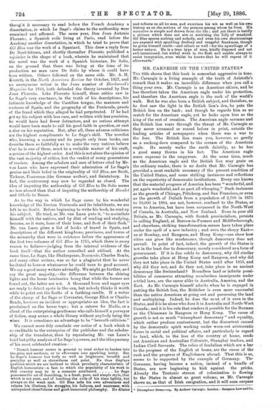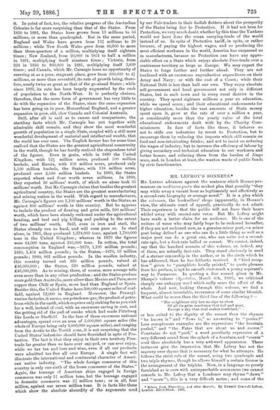MR. CARNEGIE ON THE UNITED STATES.*
THE title shows that this book is somewhat aggressive in tone. Mr. Carnegie is a living example of the truth of Aristotle's remark that it makes an incredible difference when you call a thing your own. Mr. Carnegie is an American citizen, and he has therefore taken the American eagle under his protection, and therefore the American eagle is the cock of the world's walk. But he was also born a British subject, and therefore, as he first saw the light in the British lion's den, he pats the British lion on the back ; and though he regards him as no match for the American eagle, yet he looks upon him as the king of the rest of creation. The American eagle screams and the British lion roars through the throat of Mr. Carnegie as they never screamed or roared before in print, outside the leading articles of newspapers when there was a war to the fore. The British lion roars von, however, as gently as a sucking-dove compared to the scream of the American eagle. He merely walks the earth daintily, as be has a good many thorns in his feet. The American eagle soars supreme in the empyrean. At the same time, much as the American eagle and the British lion may grate on the ordinary reader, there is no doubt that Mr. Carnegie has provided a most readable summary of the present condition of the United States, and some striking instances and reflections on the superiority of democratic institutions. Every one knows that the material progress of America has been "wonderful, and yet again wonderful, and so past all whooping." Such instances as the growth of Chicago, Pittsburg, and San Francisco, or even as the growth of Duluth from a population of 2,500 in 1875 to 18,000 in 1884, are not, however, confined to the States, or even to America, but have been surpassed in the North-West of Canada, in Australia, and New Zealand. Even in poor old Britain, as Mr. Carnegie, with Scotch provincialism, persists in calling England, at Barrow-in-Furness and Middlesborough, and elsewhere, striking transformation-scenes have taken place under the spell of a new industry ; and even the sleepy East— as at Bombay, and Rangoon, and Hong Kong—can show how cities can grow like mushrooms, though democracy does not prevail. In point of fact, indeed, the growth of the States is not in the least due to democracy, merely considered as a form of government. If it is due solely to democracy, why did similar growths take place at Hong Kong and Rangoon, and why did they not take place in the United States until after 1850, and why did they not, and do they not, take place in an ancient democracy like Switzerland P Boundless land or infinite possi- bilities of commerce attracting numberless immigrants under settled laws, are the cause alike in Australia, America, and the East. As Mr. Carnegie himself admits when he is engaged in patting the British lion, the Britisher is even more successful than the native American at going out and possessing the land and multiplying. Indeed, he does the most of it even in the States, and it is he alone who does it in Australia and North-West Canada ; and it is his rule that renders it possible for the Burman or the Chinaman in Rangoon or Hong Kong. The cause of growth is not so much "triumphant democracy" and equality, which rather produce contentment, but the discontent caused by the democratic spirit working under worn-out aristocratic forms in social and political affairs, and particularly in regard to land, which, to the loss of the country at home, sends out American and Australian Colonists, Shanghai traders, and Indian Civil Servants. The relics of feudalism which are a bar to the progress of the English at home, are the cause of the rush and the progress of Englishmen abroad. That this is so, seems to be supported by the example of Germany. The Germans, having become a nation, instead of a bundle of States, are now beginning to kick against the pricks. Already the Teutonic stream of colonisation is flowing to the States in almost as great volume, as Mr. Carnegie shows us, as that of Irish emigration, and it will soon surpass
• Triumphant Democrat"). By Andrew Carnegie. London Sampson Low AMC°.
it. In point of fact, too, the relative progress of the Australian Colonies is far more surprising than that of the States. From 1830 to 1881, the States have grown from 13 millions to 56 millions, or more than quadrupled. But in the same period, England and Wales have grown from ln millions to 26 millions ; while New South Wales grew from 40,000 to more than three-quarters of a million, multiplying itself eighteen times ; New Zealand, from 26,000 in 1851 to half a million in 1881, multiply ing itself nineteen times ; Victoria, from .224 in 1836 to 860,000 in 1881, multiplying itself 3,839 times ; and Canada, which Mr. Carnegie loses no opportunity of sneering at as a poor, stagnant place, grew from 600,000 to 41 millions, or more than sevenfold, its rate of growth being, there- fore, nearly twice as great as that of the go-ahead States ; while since 1881, its rate has been largely augmented by the rush of population to the North-West. It is perfectly obvious, therefore, that the mere form of government has very little to do with the expansion of the States, since the same expansion has been going on in poor, Monarchical England, and a greater expansion in poor, old, slow Canada and Colonial Australia.
Still, after all is said as to causes and comparisons, the startling facts which Mr. Carnegie has put together with admirable skill remain, and they show the most wonderful growth of population in a single State, coupled with a still more wonderful development of material and intellectual wealth, that the world has ever seen. The English farmer has for some time realised that the States are the greatest agricultural community in the world, though he has hardly realised the stupendous total of the figures. Even in grain, while in 1880 the United Kingdom, with 121 million acres, produced 500 million bushels, and Russia, with 158 million acres, produced only 1,500 million bushels, the States, with 118 million acres, produced over 2,500 million bushels. In 1860, the States exported wheat and flour worth seven millions. In 1880, they exported 38 millions' worth, of which we alone took 35 millions' worth. But Mr. Carnegie claims that besides the greatest agricultural country, the States are the greatest manufacturing and mining nation in the world. With regard to manufactures, Mr. Carnegie's figures are 1,100 millions' worth in the States, as against 800 millions' worth in this country. But he appears to include the product of flouring and grist mills, 100 millions' worth, which have been already reckoned under the agricultural heading, and beef and pig killing and packing to the extent of two millions' worth. Still, even in iron and steel, the States already run us hard, and will soon pass us. In steel alone, in 1881, they produced 1,374,000 tons, against 1,780,000 tons in the United Kingdom ; whereas in 1870 the figures were 64,000 tons, against 245,000 tons. In cotton, the total consumption in England was,-1870, 1,100 million pounds ; 1880, 1,404 million pounds ; in the States,-1870, 53 million pounds ; 1880, 961. million pounds. In the woollen industry, this country turned out 338 million pounds, valued at £46,000,000; the States, 320 million pounds, valued at 243,000,000. As to mining, there, of course, mere acreage tells even more than in any other production ; and the States produce more gold than Australia, more silver than Mexico and Peru, more copper than Chili or Spain, more lead than England or Spain. Besides this, the United States have 300,000 square miles of coal- field, against 12,000 in England. Moreover, the Pennsyl- vanian factories, it seems, use petroleum-gas, the product of petro- leum while in the earth, which requires only sinking for as you sink for a well, instead of coal, with an enormous saving in cost, and the getting rid of the pall of smoke which had made Pittsburg like Leeds or Sheffield. In the face of these enormous national advantages, spread over an area of 3,600,000 square miles (the whole of Europe being only 3,800,000 square miles), and ranging from the Arctic to the Torrid zone, it is not surprising that the United States' industries should have flourished in spite of Pro- tection. The fact is that they enjoy in their own territory Free- trade far greater than we have ever enjoyed, or can ever enjoy, while we tax tea and beer and wine, even if all our products were admitted tax-free all over Europe. A single fact will illustrate the international and continental character of Ameri- can native industry. "The whole foreign commerce of this country is only one-sixth of the home commerce of the States." Again, the tonnage of American ships engaged in foreign commerce was only 11 million tons, but the tonnage engaged in domestic commerce was 21 million tons ; or in all, four million, against our seven million tons. It is facts like these which show the absolute absurdity of the arguments used by our Fair-traders in their foolish flutters about the prosperity of the States being due to Protection. If it had not been for Protection, we very much doubt whether by this time the Yankees would not have done the ocean carrying-trade of the world instead of us. In spite of Protective tariff, in spite, or rather because, of paying the highest wages, and so producing the most efficient workmen in the world, America has surpassed us in manufactures, because no Protection can have any appre- ciable effect on a State which enjoys absolute Free-trade over a continuous territory as large as Europe. We may expect the States to forge further and further ahead. They are not burdened with an enormous unproductive expenditure on their Army and Navy ; or with the cost of a Court; while their National Debt is less than half our own. They enjoy absolute self-government and local government not only in different States, but in each town and in every rural district in the country. They spend eighteen millions a year on education, while we spend seven ; and their educational endowments for higher education, besides the vast amounts of State money spent upon it, grow at the rate of over a million a year, or considerably more than the yearly value of the total educational endowments dealt with by the Charity Com- missioners. In face of facts like these, it behoves us not to stifle our industries by resort to Protection, but to encourage them by reducing the imposts which still remain on food and non-intoxicating drinks ; and not to insist on reducing the wages of industry, but to increase the efficiency of labour by giving secondary and technical education to our workmen and better homes, and relieving them from the burden of Jingo wars, and, in London at least, the wanton waste of public funds by civic functionaries.



































 Previous page
Previous page